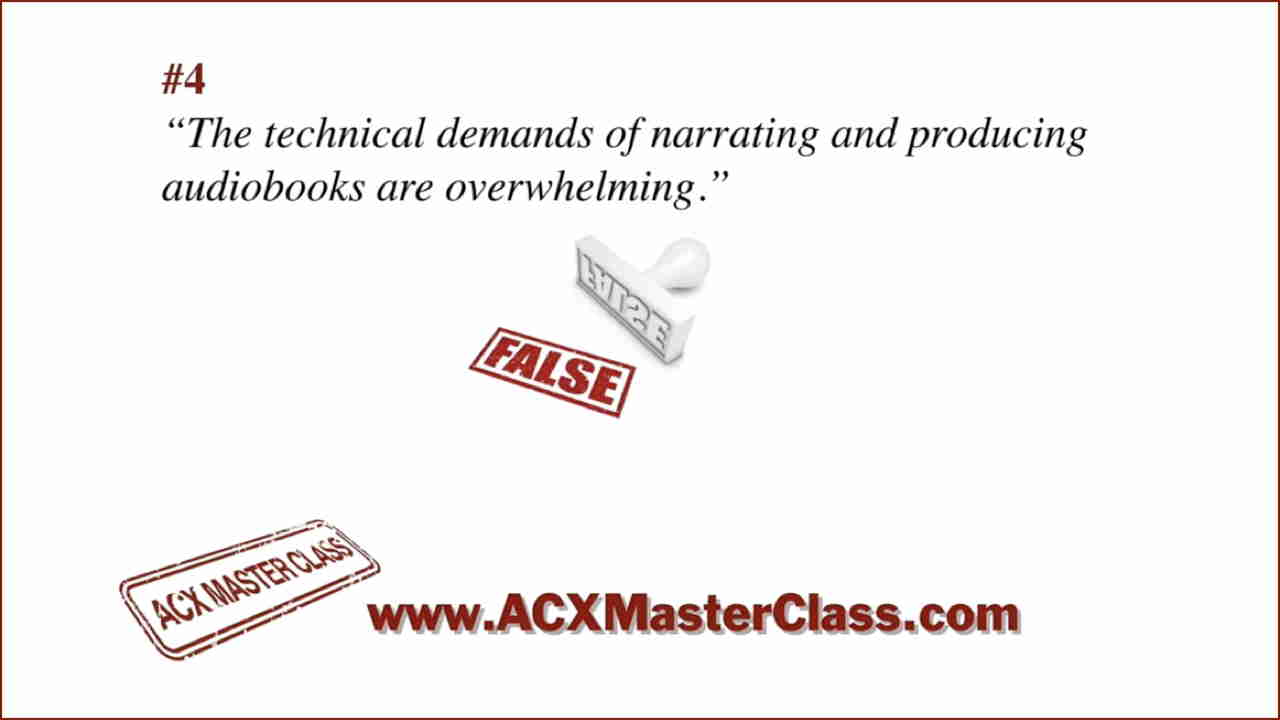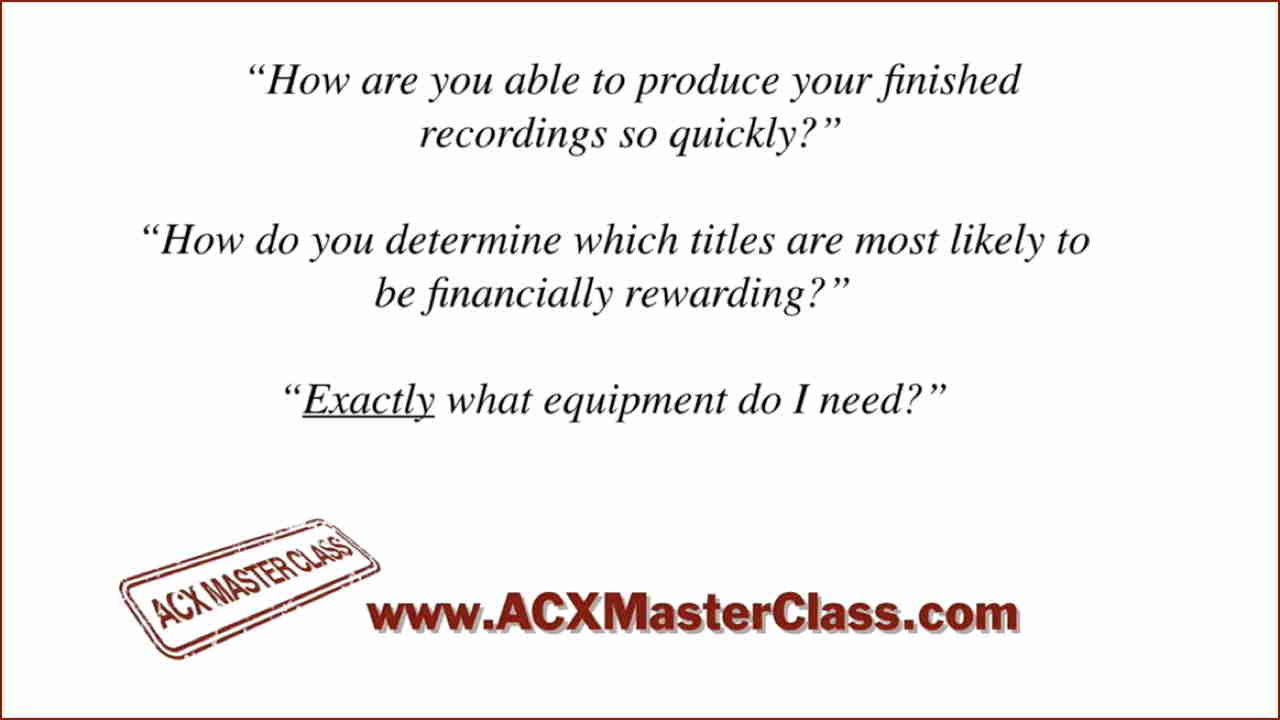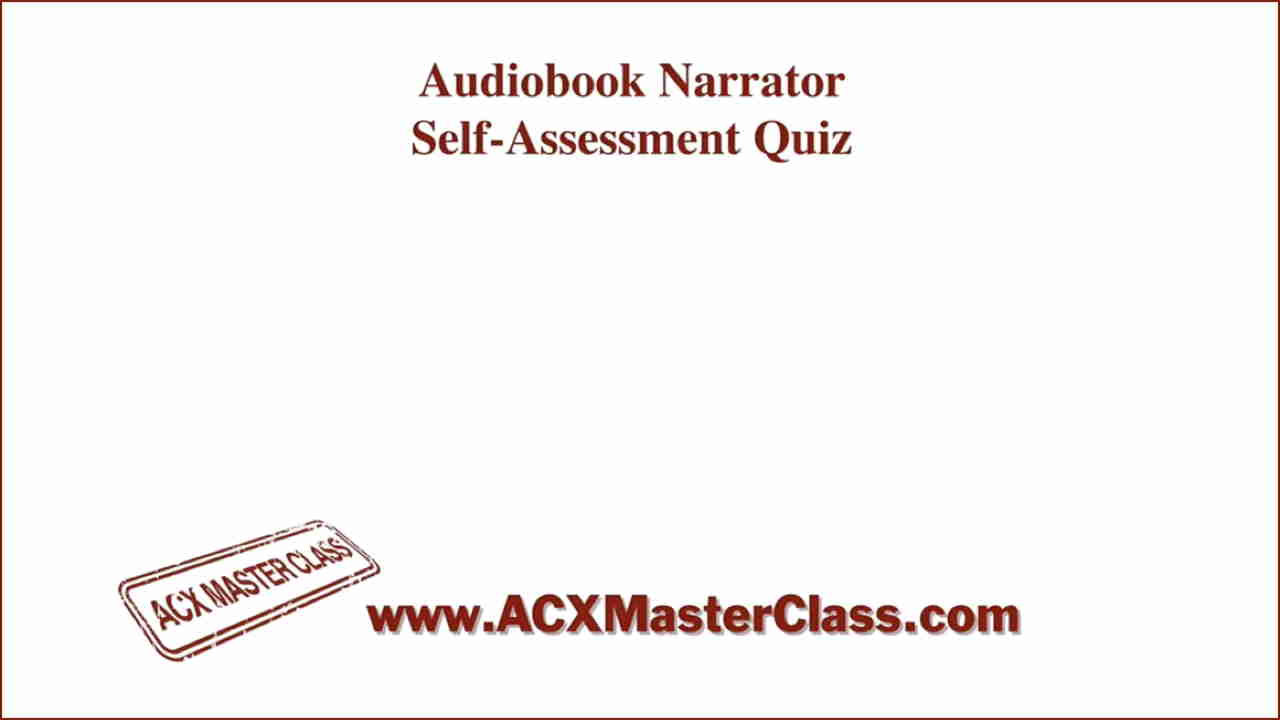The Art of Picking the Right
Audiobook Projects (Video 2)
To pause or resume the video, tap the “Play” button on the screen.
Running time: 46 minutes
Scroll down to leave a comment or question you have below the links and the Alert List sign-up
(and be sure to join the Alert List to be notified when the next video is released!)

(CLICK HERE TO WATCH: VIDEO 1) How a Retired Air Traffic Controller Launched a Thriving New Career as an Audiobook Narrator
Don’t believe “The 7 Myths You’ve Heard About Narrating Audiobooks!”

(YOU’RE WATCHING: VIDEO 2) The Art of Picking the Right Audiobook Projects
Plus: Mistakes most ACX narrators make with their profiles

(CLICK HERE TO WATCH: VIDEO 3) The Secret of Accrued Audiobook Assets
Plus: Case study of one narrator who went from “newbie” to ”star” with his first audiobook
Feel free to ask your questions here…Dan and I are ready to answer them and help you begin your journey as an audiobook narrator on ACX, for Audible and for any other production platform or publisher you want to work with.
And remember, if you miss one of the videos, you can click on the little image of that video below the main video on this page, and it will take you to that video that you missed.
So…Just post your questions below.
Hey Dan,
Your timing regarding these videos is kismet. I’ve been working at a classic rock station for almost 46 years as one of the morning show co-hosts. I still love going to ‘work’ in the morning but I’m also exploring the world of audiobook narration. A friend of mine, who is a morning show fan, just released his second novel, which I just finished reading and loved, and asked me if I would be interested in narrating his book. I jumped at the chance! BUT…..
I’m just in the beginning stages meaning I haven’t started the narration. Before we sat down to work out the details, I sent him a three-minute sample narration from the book using an audio interface plugged into my GarageBand program on my Macbook Pro with a Shure Beta 57A microphone, and the quality sounded pretty damn good. Still, I’m assuming I will have to step it up and invest in better-quality gear.
Thanks for these videos! Can I do this? Will I have the discipline and dedication it takes to become a professional audiobook narrator? I won’t know unless I give it a try. I will tell you that reading different articles and watching YouTube videos about what it takes to make it in this business is a bit overwhelming. Any motivational words of wisdom you might have would certainly be welcome.
The Shure is a great mic for instruments (guitars etc) – but it’s not the best for VO in general and audiobooks in particular. The mic we recommend is around the same cost, but designed for voice work. And I love your enthusiasm and dedication!
Thanks for your kind words! Are you at liberty to give me the details on the specific mic that is recommended for voice work?
We are currently recommending the AudioTechnica AT2040USB, along with a companion headphone amp to boost the one negative we found (a slightly underpowered headphone amp in the mic itself). Part of the training is setting up and balancing that mic and its associated gear for audiobook narration specifically (and VO in general).
We switched this past year from the AT2020USB+, as AudioTechnica decided to retire that mic from their product lineup (if you can find that one, it’s amazing).
You won’t need to make a significant investment in quality gear. The mic we recommend costs around $150.
As you can see in his response directly above this one, ACX Master Class’s Chief Technologist, David H. Lawrence XVII, says the Shure Beta 57A is a great mic for instruments (guitars, etc.), but it’s not appropriate for VO in general or for audiobooks in particular. The mic we recommend is designed specifically for voice work.
In order to take advantage of our unique, super-fast editing method, you’ll need to use Audacity rather than GarageBand. As you probably know, Audacity is free.
Re: Any motivational words of wisdom:
The technical aspects of audiobook production simply are not that difficult. The complaints you may have heard come from people who haven’t learned to approach audiobook narration properly.
But it’s possible that someone might accuse me of bias when it comes to this topic. If you’ll go to https://www.acxmasterclass.com/kudos/ , you’ll find 200+ verbatim reviews (including from lots of radio guys) who can tell you exactly what the class is like, how difficult or easy the work is, etc.
The only disqualification I can think of is if you hate the idea of sitting at home and spending 3 to 4 hours a day telling stories (that applies even to nonfiction) into a microphone. I’m certain there are some people to whom that sounds unappealing.
One other problem that comes to mind might be if you truly suffer from ADHD. Otherwise, if you have the discipline to show up for your morning show 5 days a week for 46 years, I’m sure you have the discipline to learn how to do this well and then to put it into daily practice.
BTW, I don’t think you’re on our Alert List. I hope you’ll sign up ASAP (using the blue box beneath the video); that’s the only way we’ll be able to let you know about future videos, class details, etc.
Looking forward to seeing you in class!
David,
I am very interested in recording all audiobokks. I am a workingactor . I have
Done 3 Georgia Lottery commercials!
Will you be offering the class again later this year?
We offer the live class only once per year. The rest of the year: We recuperate.
Wouldn’t an AI like descript handle most of these editing tasks ?
No, but thank you for bringing up AI – we as a community use AI to help make our product more accurate, but we don’t leave the editing up to tools like Descript. You still have to choose where the edits are made, whether via the AI-generated text or the audio itself, so it really doesn’t save any time (and is likely LESS accurate) to use AI.
Part of the class is built around a system of production that makes pickups and edits a breeze, and even fun. But AI is not a part of the editing.
Speaking of AI, with the arrival and use of AI narrators…how does this impact human narrators?
My take on it is that AI is taking over projects that don’t have the funding (or the foresight) by the creators of the projects to use human narrators, so it likely will remain a budget issue. We have seen consumers push back on AI-narrated audiobooks in a big way (they don’t sell well and they generate overwhelmingly negative reviews).
But AI isn’t just for creating synthetic voices – we DO use (and, in the course, teach the proper way to use) an AI-assisted tool, Pozotron, for proofing our work (and we love it!).
Everyone has a different opinion on this – what’s yours?
Thanks for this again! Looking forward to the 3rd video. It sounds like the editing is really really easy, and I’m excited to know more about how SAG AFTRA members can accept work on ACX.
I’ll spare you the suspense: SAG-AFTRA members can audition for and can accept any job offered on ACX. No fine print, no tricky loopholes. SAG-AFTRA was smart enough to negotiate a special contact with ACX; you can’t get in trouble for accepting an ACX job.
Good news!